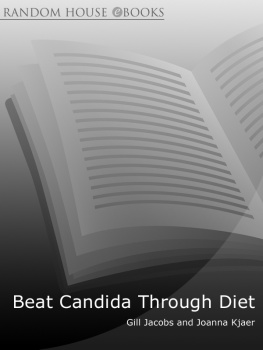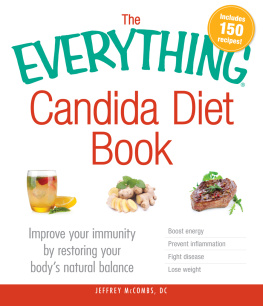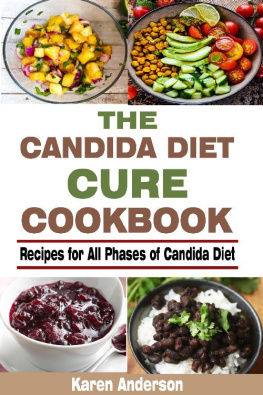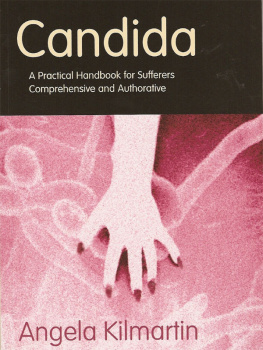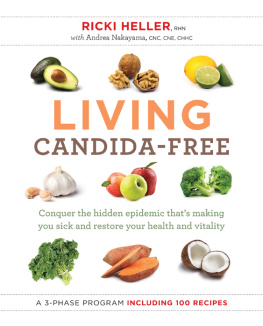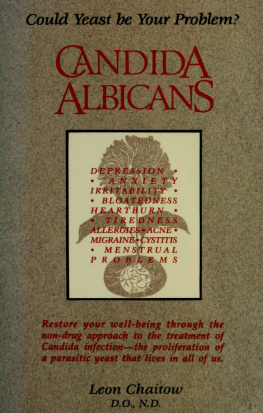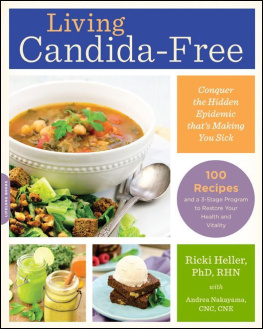Contents
About the Authors
Gill Jacobs
Gill Jacobs is author of Beat Candida: From Thrush to Chronic Fatigue (Vermilion, 1996), Candida Albicans: Yeast and Your Health (Optima 1990), and The Natural Way: Chronic Fatigue Syndrome (Element Books 1998).
A former sociology lecturer, and health education teacher, she became a health writer in order to publicise the plight of thousands of women and men who have problems with yeast infection and gut dysbiosis, and who find it hard to get help. For the past nine years she has been a trustee of the charity Action for ME and Chronic Fatigue, with a particular interest in nutritional approaches to recovery, and campaigning for wider recognition. Having run a series of one-day workshops for candida sufferers, as Candida Workshops, with the health writer Jane McWhirter, they now run conferences for holistic health practitioners. Together they have produced a three hour video on candida treatment and management, in order to provide support and encouragement to sufferers who are battling with their health.
Joanna Kjaer
Joanna Kjaers cooking style has been influenced by her travels around the world. Her first major culinary venture was Joannas Kitchen, making organic breads for the green markets at Spitalfields and Portobello in London.
Food for Life, the healthfood restaurant at the Hale Clinic opened soon afterwards. Here, with customer feedback, she was able to refine recipes, and learn more about food sensitivity from some of the leading practitioners in the field. In 1996 Kjaers Food for Life launched a range of organic breads, cakes and biscuits for special diets.
Joanna Kjaer continues to publish recipes while practising in Norfolk as a Dietary Therapist. She also works for Norfolk County Council Adult Education Health and Sports Studies.
About the Book
Do you suffer from one or more of the following?
- recurrent thrush
- chronic fatigue
- headaches
- abdominal pain
- constipation
- sugar cravings
- yeast intolerance
- severe PMT
- digestive problems
- deterioration in health since taking antibiotics, the pill, steroids or HMT
If so, then candida could be your problem.
This book provides a practical step-by-step plan for managing your diet and lifestyle to help control candida (yeast) overgrowth in the body. Gill Jacobs takes you through the candida maze, clearly explaining what it is, how it is caused, how to test for it, and why there is often underlying problem with the way we digest food.
The principles of digestion and health are explained, and detailed guidelines are given on all aspects of candida control probiotics, the latest natural anti-fungals, and supplements to boost immune defences.
Containing guidance on which foods will help and which foods wont, this book includes the 3 stage Beat Candida Diet and over 100 recipes for everyday eating and entertaining by Joanna Kjaer, leading expert on special diets.
Foreword
BY DR JOHN BRIFFA
When I first became interested in the subject of natural medicine I became aware of a good deal of information implicating candida albicans in a wide variety of conditions. From chronic fatigue to irritable bowel syndrome, and dandruff to insomnia, yeast was seemingly to blame. At medical school we were taught that candida was responsible for thrush in women, and would sometimes run riot in the bodies of the seriously ill. Now it was being suggested that this little yeast organism was an important factor in just about every illness for which the medical profession had no explanation. Naturally - bearing in mind what I had learnt during my medical training - I was sceptical.
However, my dealings with patients taught me that even when factors such as nutritional deficiencies and food sensitivity were corrected, a proportion of people did not get well. More out of desperation than anything else, I began to start treating selected patients with the anti-candida protocol. To my amazement, a diet low in yeast, sugar, alcohol and refined carbohydrates, supported with specific nutritional supplements brought about dramatic improvement in a great many of these patients. In a few, symptoms that had been around for 20 years or more vanished within a few days or weeks. My initial scepticism regarding the role of candida in modern day illness was quickly dispelled through my experience with patients.
Yet, while the anti-candida regime can often bring about near miraculous improvements in health for many people, no- one has ever claimed it was easy: the diet usually demands that individuals make sweeping changes to their diets and forego some of their favourite foods. Over the years I have become convinced that two factors are very important in determining an individuals success on the anti-candida regime. Firstly, they must understand the beast they are dealing with and why certain dietary changes are necessary. Secondly, the diet should be interesting, tasty and varied.
This book provides information that satisfies both these criteria. Gill has provided a clear account of candida, the problems it can cause and the principles behind its treatment. To complement this, Joanna has provided an array of mouth-watering recipes that will liberate those on an anti-candida regime from endless meals based around brown rice and vegetables. Together, Gill and Joanna make a formidable team. Follow the advise in this book and you cant fail to feel the benefit, both in terms of your health and your culinary repertoire.
Dr John Briffa BSc(Hons) MB BS(Lond)
Nutritional Physician
March 1997
Introduction: The Diet Connection
The role of candida overgrowth in health and disease is not fully recognised by conventional medicine, despite the thousands of people who are undoubtedly affected by it, often as a result of over-use of antibiotics.
In fact there are thousands of scientific papers on the role of yeast and fungi in illness. Many are by veterinarians, or by doctors and medical researchers in Germany and Russia. Vets have to concern themselves with keeping animals alive and productive, and animals reared for food are exposed to the negative affects of constant antibiotic use. Both Germany and Russia are rye growing regions, where an appreciation of the natural souring fermentation process is important because rye bread cannot be baked naturally. Thus microbiological research in this area developed out of commercial interests in the food and wine sector. The controversy and denials surrounding candida-related diseases in the USA and the UK are not so prevalent. German research on ME has investigated the role of candida overgrowth in the illness and found it to be present in a large proportion of cases.
The difficulty is that many who suffer from candida overgrowth do not know why they are ill or how to get better. And whilst conventional medicine in Britain and the USA is unwilling to take candida seriously, sufferers are forced to rely on self-help books such as this, media interest, and complementary medicine.
The importance of diet
When Jane McWhirter and I set up our first Candida Workshops we thought we knew what most people needed to get out of them group support to give them renewed motivation, and hope. This was partly true. But equally the participants had a desperate and compelling need for inspiration and guidance on what and how to eat. The diet connection with candida seemed to be the biggest hurdle, and the biggest burden. Somehow, sufferers were stuck with the feeling of deprivation and inadequacy. Whatever they had cooked before was no longer relevant. Omitting so many ingredients seemed a mammoth task. Finding the energy and time to manage new foods and new health principles was not easy, especially if cooking for others was part of the problem.

